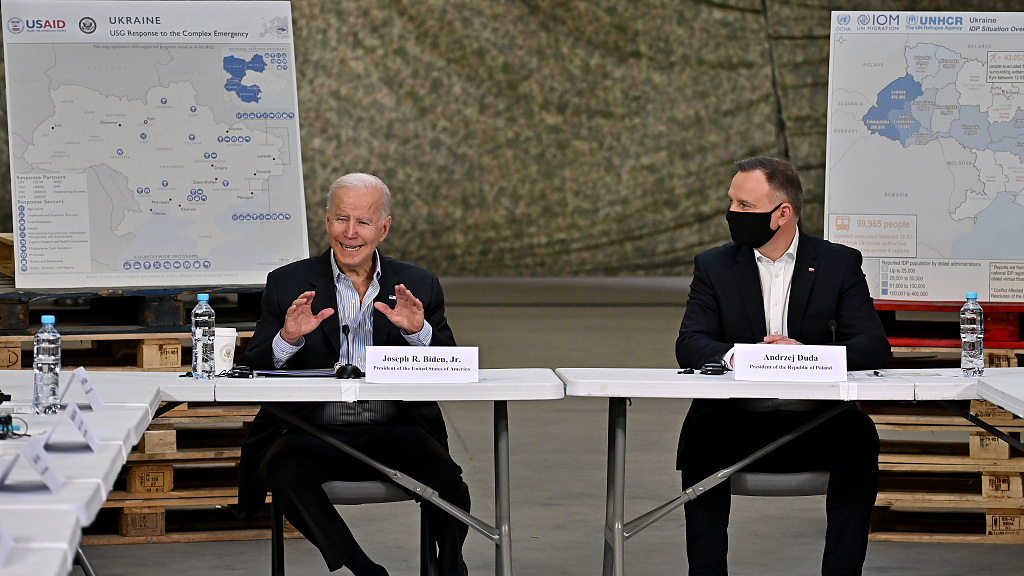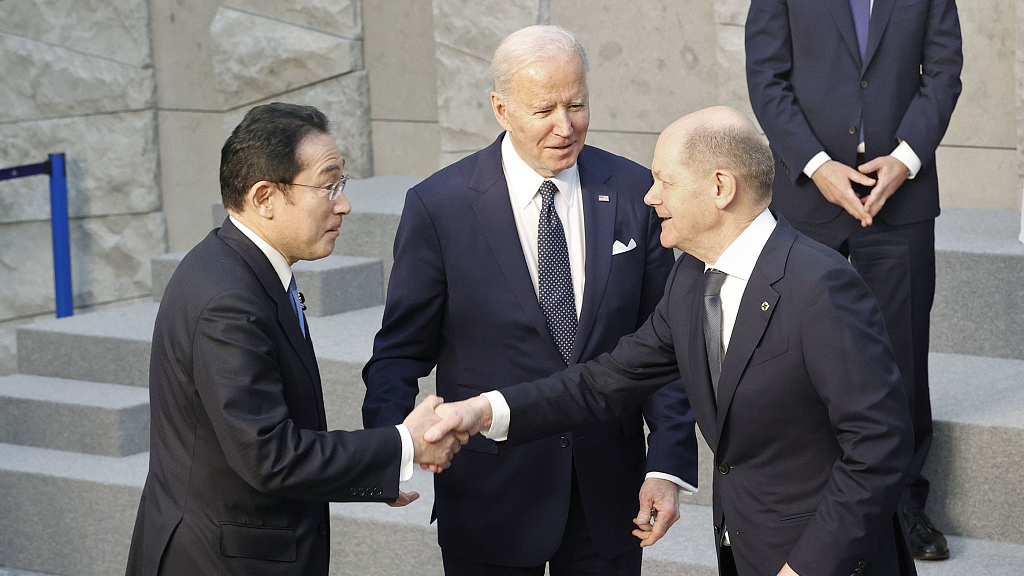
U.S. President Joe Biden (L) meets with Polish President Andrzej Duda in Rzeszow, Poland, March 25, 2022. /VCG
U.S. President Joe Biden (L) meets with Polish President Andrzej Duda in Rzeszow, Poland, March 25, 2022. /VCG
Editor's note: Iliya Kusa is a journalist and political expert in Kyiv. The article reflects the author's views and not necessarily those of CGTN.
U.S. President Joe Biden's visit to Europe has become one of important midpoints in the context of Russia's military offense against Ukraine. When analyzing the results of the NATO summit, subsequent bilateral US-EU negotiations and Biden's ultimate visit to Poland, several conclusions could be drawn.
First and foremost, it became clear that the U.S. has embarked on a policy of mobilizing political and ideological allies in Europe and other regions for their strategic purposes. Russia's military offense against Ukraine gave the Biden administration an excellent opportunity to consolidate influence over NATO allies, bring them together again under an American-led "security umbrella," further strengthening bilateral ties with EU countries most inclined towards Washington such as the Baltic states, Poland, Romania, Czech Republic and Slovakia. These countries are now the most active in supporting Ukraine politically, diplomatically and militarily acting as transit hubs for arms supplies from U.S. and NATO.
Second, Washington has shown its reluctance to accommodate Ukrainian request to provide Kyiv with heavy weaponry, namely Soviet and Russian-made anti-aircraft systems or planes, which the Ukrainian government believes to be able to deny Russia's advantage in the sky. Such cautious policies, which were reiterated by Biden during his Warsaw speech, are likely to further stall the situation in Ukraine, in turn dragging Russia deeper into the conflict, likely depleting its resources and allowing American-led Western sanctions to persist. However, this may be one of Washington's ultimate tactical interests for the time being.
Third, the U.S. is trying to step up the formation of a global Western coalition, which is essential for Washington as part of their strategic rivalry with China. Judging from Biden's Warsaw speech and his NATO summit comments, his administration is attempting to do so by effectively reenacting some of the 1980s ideological constructs by dividing the world into liberal democracies and conservative autocracies, once again resurrecting the ghost of "Axis of Evil." Russia's military offense against Ukraine is giving the U.S. the necessary excuse, background and context to further promote this narrative.

Japanese Prime Minister Fumio Kishida (L) and German Chancellor Olaf Scholz (R) shake hands ahead of a summit of the Group of Seven nations with U.S. President Joe Biden (C), in Brussels, Belgium, March 24, 2022. /VCG
Japanese Prime Minister Fumio Kishida (L) and German Chancellor Olaf Scholz (R) shake hands ahead of a summit of the Group of Seven nations with U.S. President Joe Biden (C), in Brussels, Belgium, March 24, 2022. /VCG
Fourth, the West has apparently become entrenched in its policies of a gradual reduction of Russia's share of energy exports to the European market. It will not happen quickly, which is why a number of EU countries led by Germany are reluctant to strengthen sanctions against Russia's energy sector. For the U.S., this is a potentially lucrative process as Washington gets the opportunity to capitalize on the conflict in Ukraine by participating in the redistribution of energy markets. During Biden's visit to Brussels, the U.S. promptly secured a new gas deal by committing at least 15 billion cubic meters of additional supplies for Europe by the end of this year.
Given the fact that the U.S. is planning on becoming the leading gas-exporting country in the world by 2024, EU's strategy to ensure demand for 50 billion cubic meters of fuel by 2030 fits in well with the U.S. energy goals. Swift changes in European energy policy as a result of Russia's military offense against Ukraine will take years and Washington wants to be part of these transformations.
The latest rounds of sanctions which were agreed by U.S. and EU allies looked like a "middle option" between doing nothing and imposing particularly radical ones proposed by Poland, Slovenia and Czech Republic in their "10-point plan," which included cutting off all Russian banks from SWIFT system, suspending visas for all Russian citizens and establishing a naval blockade of Russian ships. It seems that till today the issue of sanctions is still debatable between Western allies with the U.S. together with Baltic states and Poland pushing for harder restrictions, while Germany, France, Austria, Hungary and others opting for a more cautious stance.
As for Russia-Ukraine peace negotiations, the NATO summit and Biden's visit to Poland yet again demonstrated that the West doesn't seem to have a unified approach to this issue. Most European countries are eager to see Russia and Ukraine reach a compromise on major issues regarding military conflict. The U.S. is not interested in directly engaging in these negotiations as personal communication between Biden and Putin is apparently broken.
All in all, the NATO summit didn't produce fundamental changes to Western approaches to the Russia-Ukraine conflict. Their priority is still focused on supplying Ukraine with arms, financial resources and political support necessary for empowering Kyiv's defense capacities, but at the same time avoiding steps which could lead to an escalation and even military confrontation between Russia and NATO.
In addition, Russia-Ukraine peace negotiations are still ongoing, although with no substantial results so far. European allies and the U.S. seem to have minimal role in facilitating peace negotiations. Among key interlocutors in the Russia-Ukraine dialogue are currently Israeli Prime Minister Naftali Bennet and Turkish president Recep Tayyip Erdogan.
The main stumbling blocks in these negotiations are Russia's demands that Ukraine recognize Crimea as part of its territory and the independence of breakaway eastern regions of Donetsk and Luhansk. The Ukrainian government refuses to do so under any circumstances as this would mean utter collapse of Ukraine's territorial integrity and gradual weakening of its sovereignty.
(If you want to contribute and have specific expertise, please contact us at opinions@cgtn.com. Follow @thouse_opinions on Twitter to discover the latest commentaries in the CGTN Opinion Section.)

